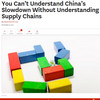Bringing supply chains home
Is everything still “Made in China”? According to Simchi-Levi, the answer is No. An increasing number of companies are sourcing and producing nearer and nearer to their markets, in an effort to better manage their supply chain risks:
Global companies have realized in the last few years that strategies such as outsourcing and off-shoring have significantly increased risk because their supply chain is geographically more diverse and, as a result, exposed to all sorts of potential problems. A recent example is the explosion at a warehouse in Tianjin that ships hazardous materials, which was most likely caused by a company culture that flouted regulations. This drives companies to reevaluate their supplier and manufacturing base in order to increase flexibility and reduce risk.
The current turmoil in China will most likely accelerate the trend to near-shoring, but the impact will vary by specific industry and company.
For high tech industries (e.g., the manufacture of laptop computers and mobile phones) recreating the infrastructure in China somewhere else would be expensive and difficult to do. In contrast, it will be easier for footwear and apparel companies to move to lower-cost locations. Manufacturers of heavy products such as appliances or cars that are heavily influenced by shipment costs may find it pays to move production closer to market demand.
The bottom line: Companies need to evaluate on an ongoing basis whether the trade-offs for their particular industry have shifted enough to justify a change in their sourcing strategies.
This reminds me of a post I made in 2010, Outsourcing – Risking it all? reflecting on an article and a presentation made by Jack Barry ten years ago, where he raises some fundamental concerns about the then current trend towards global outsourcing and its consequences. Yes, it may be cutting the costs, but it is not cutting the risks.
In Global Risk: Outsourcing Services, A New Aesop’s Fable of the Ant and the Termite, a presentation he made to the Institute for Supply Management, ISM, he reviewed his article and his thoughts behind it. If I summarise some of his slides, he said
The benefits of globalisation:
India develops my software
Ireland manages my customer service
Taiwan does my testing
Mexico performs piece labor
Germany balances my finances
Israel does my clinical research
… my supply sources are global.
>>> I have the lowest overall cost of services
The risks of globalization:
India owns my IT process and innovation
Ireland is between me and my customers
Taiwan controls my quality control
Mexico dominates my capacity curve
Germany leverages my finances
Israel has first views of my innovation
… my supply sources may be beyond my laws and conventions.
>>> I have the highest level of risk to continued operations
I guess what Barry said back then isn’t any less valid today, and you can find the full presentation for download below.
My own conclusion is that in the same way that cost-cutting is what lead companies to pursue outsourcing and offshoring in the past, risk-cutting is what now may now lead companies into sourcing and producing their goods nearer to their markets, because in sum it is less risky AND less costly. As long as labour cost and production costs were low, along with minimal logistics cost per unit, due to the sheer volume of goods that were shipped around the globe, offshoring and outsourcing made sense, but it also made supply chain risk less controllable. That realisation is perhaps finally sinking in.
Reference
Simchi-Levi, D. (2015) You Can’t Understand China’s Slowdown Without Understanding Supply Chains. Harvard Business Review. Retrieved 2015-10-02 from https://hbr.org/2015/09/you-cant-understand-chinas-slowdown-without-understanding-supply-chains
Barry, J. (2004). Supply chain risk in an uncertain global supply chain environment International Journal of Physical Distribution & Logistics Management, 34 (9), 695-697 DOI:10.1108/09600030410567469
Author link
- linkedin.com: David Simchi-Levi
- linkedin.com: Jack Barry
Related links
- hbr.org: You Can’t Understand China’s Slowdown Without Understanding Supply Chains
- opsrules.com: China slowdown and your supply chain strategy
Download
- Jack Barry: Global Risk: Outsourcing Services
Related posts
- husdal.com: Book Review – Operations Rules
- husdal.com: Outsourcing – Risking it all?
